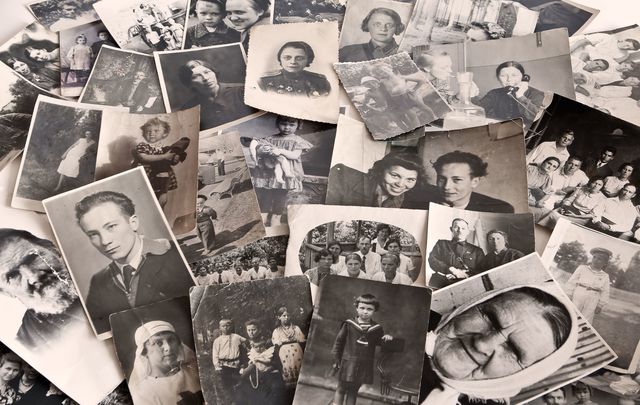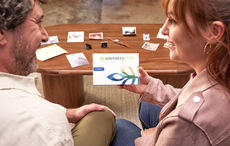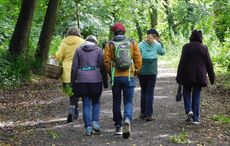Genealogy: When it’s going well, it’s wonderful. You’ve just discovered that your great-great-great-grandma Irma was a fearless pirate and St. Patrick is basically your second cousin. But when it’s going poorly, you’ll want to bash your head against the wall. Here we try to give you pointers on where to start.
Today, we have so many genealogical records at our fingertips. Yet it’s often hard to identify your relatives with any certainty amongst millions of other people. You might know you have Irish heritage of some sort but be at a loss for where to start exploring it further. And once you do get started, there are plenty of challenges along the way, some invigorating, and some just frustrating.
This article is for you if you’ve gotten stuck in your Irish family history research. My tried-and-true method for getting unstuck is as follows:
- Take a break.
- Treat myself to some Baileys.
- Try something new.
It’s that “try something new” step that this article focuses on. Getting unstuck requires a little creativity and a willingness to pursue new research avenues. Below, I offer seven tips: seven new avenues to explore, seven new things to try, seven new ways of looking at your research.
But first, determine what your roadblocks may be. Let’s go through a few common problems you may encounter while exploring your Irish roots.
- Genealogical records never existed or have been destroyed. Maybe there are gaps in official state or church records. Maybe a time of upheaval led to the loss or destruction of records. These problems get worse the further back you go in history. In the Middle Ages, you’ll likely run into considerable challenges locating your ancestors unless they were literal royalty, or at least prominent aristocrats or authorities.
- You can’t find any relevant records. You’ve tried a few Google searches or run an ancestor’s name through a genealogical database, but nothing good has turned up. You’re overwhelmed by the sheer amount of resources and information out there and aren’t sure how to undertake an organized research agenda.
- You’ve got some crucial information wrong. Perhaps you go looking for your great-grandparents in County Cork when really they hailed from County Kerry. Or all you know is “Ireland,” rather than a precise county or town. Or you’ve searched for a specific ancestor by name without finding any results, but you haven’t tried searching common spelling variations of the name.
In many cases, identifying the precise source of your difficulties is the first step to resolving them! Try to put your finger on what, exactly, you are trying to learn or discover.
Many people run into issues because they have extremely foggy notions of what they hope to discover. “I want to learn more about my family.” Great … but what does that mean?
Pinpoint what questions you want to be answered and what knowledge you seek to gain from your research. Specific goals are achievable goals, and specific problems are solvable problems.
Now, on to some advice for overcoming roadblocks in your genealogical research!
#1: Focus on location
It’s really not enough to know only that your ancestors came from Ireland. To find records, you need to narrow the location down as much as possible, at least to the county, ideally to the exact town or city.
Conducting oral history interviews with living family members is a great way to learn specific locations. You’ll, of course, want to ask your relatives about their lives, prompting them to tell their most memorable stories, harrowing adventures, and tales of derring-do.
But remember also to ask them for mundane facts like specific locations (and dates and names). Some sample questions to ask:
- When and where were you born?
- When and where were your parents born? Your grandparents?
- When did your family immigrate to [New Country]? Where did they settle? How did they come to live in [Town]?
- When did you move to [City]?
- What do you know about your family name? Where does it come from? Has it always been spelled this way?
- What religion is your family? How long have they belonged to their faith?
The more you can nail down specific details, the better your chances of finding relevant records, whether birth certificates, census records, or immigration records.
#2: Get (and stay) organized
Sometimes roadblocks arise because you’ve been successful with your research—finding tons of information, raw data, and records—but you haven’t kept everything organized.
Over time, as more and more records pile up, you lose track of your research and overarching goals. How are these people connected? How does the overall story hang together?
If you’re serious about genealogy, I recommend investing in some form of genealogical software. There are multiple options available at various price points. Examples include:
These software programs essentially serve the same purpose: Organizing your data and displaying it in an accessible format.
So before you get too deep into your family history, set yourself up with one of these programs to make your life that much easier.
Now a few of you may prefer kicking it old-school with just a pen and paper—and that’s fine too. A paper notebook may be more difficult to search, and you won’t be able to sync results with anything else. But if you’re an organized note-taker who prefers traditional ink and paper, that’s certainly possible.
#3: Consider naming variations
Irish surnames are a complicated topic! Surnames are an essential part of conducting searches, but they’re not as stable as a genealogist might wish. You could spend ages trying to find your ancestor Mary Riley—but she’s listed in records as Mary O’Reilly!
This article recommends taking the time to learn the original Irish surname—say, Ó Raghailligh—and its pronunciation, and then also noting down all the English variants that have developed, like O’Reilly, Riley, and more.
Naming inconsistencies have confounded and stymied countless budding genealogists. Don’t let it happen to you! Keep an open mind and expect to come across creative spellings in the records.
#4: Take a class or webinar
Some libraries and genealogical societies offer in-person classes, either on family history basics or on specific themes. You can ask for advice from the teacher and possibly meet some likeminded folks to swap tips with.
How to find a class? One good place to start is searching for a local Family History Center or FamilySearch Affiliate Library. There are several thousand of these centers located in well over 100 countries.
What if you don’t have access to an FHC or in-person genealogy class? Well, that’s what the internet is for! A quick search will reveal plenty of webinars on a dizzying array of topics: Check out this lengthy list of webinars offered by the BYU Family History Library.
This excellent webinar by James Tanner provides over an hour of advice on busting through brick walls in genealogical research. Though it’s not specifically geared toward Irish genealogy, it’s a very helpful overview of strategies for overcoming roadblocks, complete with a demonstration of search techniques.
Or you can try out Ancestry’s helpful video, “Genealogy Brainstorming: I’m Stuck. Now What?”
Since Irish genealogy is so popular, there’s also a wealth of information specifically tailored to you! Ancestry offers this webinar on the topic “Tracing Your Irish Ancestors Back to the Homeland.”
#5: Try different kinds of records
Let’s say you’ve already had some success tracking down the basic church and civil records: baptisms, marriages, deaths, census records, maybe even military service. And now you’re looking to expand and flesh out your knowledge of your ancestors. You want something more.
Now’s the time to learn about the great variety of additional records that can potentially add some color to your family tree.
In this case, you’re not so much stuck as ready to move on to more advanced things. Nonetheless, you may be wondering where to go from here. What’s next, once you’ve exhausted the more obvious sources?
I suggest diving into a couple of longer guides to Irish family history. The first is offered by the National Library of Ireland (available as a PDF at the bottom of this page). It walks you through various record genres and explains how to find and use sources like tithe applotment books, estate papers, maps, wills, court records, and prison records.
The second is Sean Murphy’s excellent 60-page primer of Irish genealogy, which will acquaint you in-depth with a wealth of source types: Newspapers, occupational records, directories, and more. Created in 2017, this guide is still pretty up-to-date. Plus, it’s freely available online!
#6: Take a DNA test.
Do a little research so that you understand what each type of DNA can (and can’t) tell you. There are three basic kinds of DNA tests: Autosomal DNA, mtDNA, and Y-DNA. An autosomal DNA test is the most common. It goes back about four or five generations and is pretty good at identifying your ethnicity.
If you suspect that you’re a mix of Irish, English, Welsh, and Scottish heritage, then I recommend the Living DNA company, which divides the British Isles into 21 distinct ethnic regions—a pretty good level of detail! Note however that Ireland constitutes its own region, so the test can’t pinpoint your ancestors any more specific than that.
An autosomal DNA test can help you track down as-yet-unknown living relatives and even make contact with people who have matching results.
A Y-DNA test traces paternal lineage (you can only take this test if you have a Y chromosome). A study from Trinity College Dublin indicates that numerous Irishmen have Y-DNA potentially linking them all the way back to Niall Noígíallach (Niall of Nine Hostages), the famed hostage-taking fifth-century king. Take a Y-DNA test to see if you, too, descend from this legendary chieftain.
#7: Seek help from the broader genealogical community.
Did you know that the National Library of Ireland in Dublin offers a free genealogy advisory service? You can simply walk in on weekdays (check here for current opening hours) and receive help with your research. Personalized attention is an efficient way to overcome stubborn stumbling blocks.
If a trip to Dublin isn’t in the cards just yet, you can email or call the NLI. You can also seek out an online genealogical community such as the Ancestry message boards.
Or, as suggested above, try to find a local Family History Center. Their staff volunteers are knowledgeable and happy to lend a hand. Call up beforehand to explain the kind of help you would like, and see if they are able to assist you.
Join your local genealogical society. These societies are yet another place where you can seek advice from more experienced researchers and maybe even meet some travel buddies for your trip to Ireland!
Do you have any tips for getting started in your Irish genealogical research? Share in the comments!
* Originally published in Aug 2018, updated in Oct 2022.
This article was submitted to the IrishCentral contributors network by a member of the global Irish community. To become an IrishCentral contributor click here.




Comments